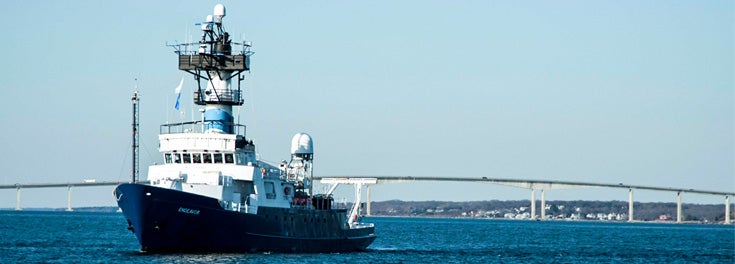
For exactly 40 years, University of Rhode Island scientists and students have traveled the world’s oceans aboard the R/V Endeavor, the 185-foot research ship based at our Narragansett Bay Campus. Along with researchers from dozens of other institutions, they’ve explored the Black Sea for ancient shipwrecks, studied plankton in the North Atlantic, assessed the effects of the Deepwater Horizon oil spill in the Gulf of Mexico, and conducted innumerable other studies from the South Pacific to the Arctic and almost everywhere in between.
To celebrate this important anniversary, the Graduate School of Oceanography welcomed more than 4,000 visitors of all ages to a September 10 open house offering tours of the Endeavor, exhibits about numerous oceanographic topics, and a touch tank of marine life from Narragansett Bay.
The event was spectacular, highlighting what most people on campus already know: the Endeavor provides students with one of the most unique educational experiences anywhere. This floating classroom with access to the latest oceanographic instruments—including telepresence technology that streams live images of the ship’s activities to the Inner Space Center—offers students the hands-on opportunity of a lifetime. One summer class in ocean ecology, for instance, journeyed 110-miles south to the edge of the continental shelf, where students went scuba diving to collect specimens, trawled for fish as deep as 1,800-meters, and conducted measurements of the physical characteristics of the water column.
“This experience just caused my love for the ocean and marine life to grow immensely,” said Jillon McGreal, a 2015 graduate who enjoyed pulling in the nets and working with the ship’s crew. “Because of this class I was able to make stronger connections with people in the professional marine biology world, and it became more clear to me that I want to continue on to graduate school to do research.”
Another group of students spent spring break aboard Endeavor studying plankton in the Gulf of Maine with Professor Susanne Menden-Deuer, collecting plankton samples at various depths at six sites around George’s Bank and conducting experiments in an on-board incubator. Despite occasional high seas and rough weather, student Emily Bishop said there is no better way to test your skills as a marine scientist than to go to sea. “Basic laboratory skills, like looking through a microscope without getting nauseous, become 10 times harder on a ship,” she said.
Microbiology major Victoria Fulfer said her favorite part of the expedition was simply standing on deck while deploying instruments and seeing nothing but the vast ocean. “I learned that I love being out in the ocean on a ship, even in rough conditions,” she said. “There’s nothing better than sleeping with the swaying of the ship. And I gained so much experience with techniques and instruments that I could never get from a normal lecture or lab course.”
Students also have opportunities to occasionally join expeditions aboard research vessels operated by other institutions, and URI has several smaller boats that allow students in ocean engineering, marine affairs, fisheries, oceanography and other disciplines to learn and conduct research in Narragansett Bay and nearby coastal waters.
“I learned a lot about pelagic ecology aboard Endeavor,” said Jillon, “but the whole process of going on a research cruise was invaluable.”
